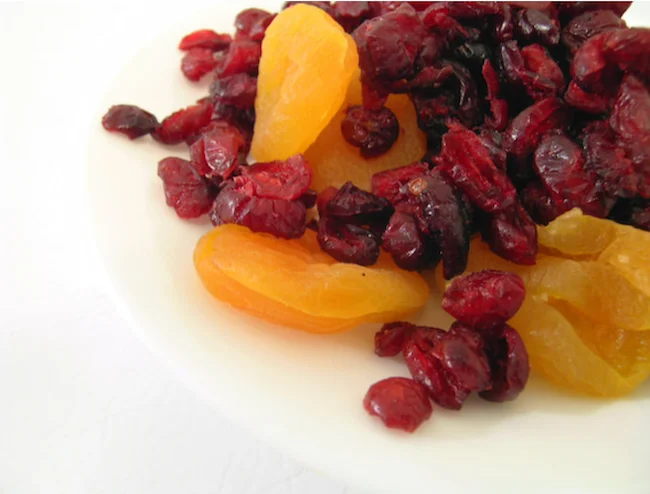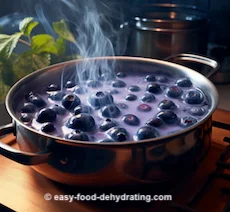What We Mean by “Dehydrate”
Here at Easy Food Dehydrating, “dehydrate” always means using an electric food dehydrator — the easy, reliable way to dry food at home.
- Home
- Articles On How To Dehydrate Food Safely
- Keeping Dehydrated Fruit Fresh: Essential Storage Tips
Keeping Dehydrated Fruit Fresh:
Essential Storage Tips

Keeping dehydrated fruit fresh doesn’t have to be difficult—but it does require the right preparation, storage, and moisture control. Dehydrating is a budget-friendly and chemical-free way to preserve fruit, but if it’s not stored properly, it can quickly spoil.
✅ Quick Answer: How do you keep dehydrated fruit fresh?
Store dehydrated fruit in airtight containers, condition it to balance moisture, and keep it in a cool, dark place. Add oxygen absorbers or vacuum-seal for longer shelf life, and always inspect for mold or spoilage before eating.
Whether you're new to dehydrating or just want to improve your shelf life results, these essential storage tips by guest writer Jackie Edwards will help keep your dried fruit tasting fresh and safe for longer.
Guest Post by Jackie Edwards

Dried fruit is healthier, too: dried grapes, grapes, and cranberries have been found to contain twice the amount of antioxidants as fresh versions, reveals the Journal of the American College of Nutrition.
If you want your fruit to taste great and last as long as possible, it's important to handle and store it correctly. Follow these tips to prolong the shelf life of your dehydrated fruit.
How to Prep Fruit Before Dehydrating

Choosing fruit of peak quality will not only ensure deliciousness but also help overall when keeping dehydrated fruit fresh - longer. The larger the fruit, the longer it takes to dehydrate, so slice it thinly.
Briefly soak fruits like blueberries, and cranberries in boiling water to break the skin before blotting it dry.
You can also treat it to minimize oxidation, preserve vitamins, and lengthen shelf life. Add 1/2 a teaspoon of powdered citric acid to two cups of water and place your fruit in the solution for ten minutes.
If you don't have citric acid, using a solution of equal parts lemon juice and water will do.
It's essential to do this to keep dehydrated fruit fresh, especially those that easily turn brown like apples, bananas, peaches, and pears.
Why Conditioning Dehydrated Fruit Is Crucial
Your fruit needs to be allowed to fully cool and dry before it's canned since warmth and moisture cause sweating and mold growth. Moreover, fruit usually needs even more time to dry out than vegetables because of its high moisture content.
Some pieces may also be moister than others due to their size or positioning on the dehydrator. So, once your fruit's cooled, place it in sealed, airtight containers—like glass jars—and leave it to sit for about a week.
This process is called "conditioning". The excess moisture in some pieces will be absorbed by drier pieces. Make sure to shake the container each day to prevent sticking.
How to Check Moisture in Dried Fruit
The ideal moisture content for properly dried fruit should be around 15-20%. Any higher: mold growth becomes a risk.
Periodically test the moisture by giving your fruit a quick squeeze. If juice comes out, it's not ready.
Best Temperature for Storing Dehydrated Fruit
When canning your fruit, be careful not to overfill the containers. Every time they're opened, air, moisture, and light exposure will deteriorate the food. Avoid storing your jars on the kitchen counter.
Sunlight and high temperatures always cause faster spoilage. Instead, keep your jars in a cool, dark, and dry place, such as your cabinets or pantry.
On average, dried fruit lasts for one year if kept at sixty degrees, but only six months at eighty degrees. Alternatively, storing your jars in the fridge or freezer can help keep them fresh and crisp for far longer.
Consider investing in a fridge or freezer with extra storage space that leaves enough room to store your jars all year round. Moreover, if you live in a hot, humid location with poor air conditioning, refrigerating or freezing dehydrated food is a necessity.
Finally,
it's important to always check the fruit before eating. If you notice
signs of mold or spoilage, bin it immediately. Using these tips will
help your dehydrated fruit stay fresh and safe for far longer.
How Often Should You Inspect Stored Dried Fruit?
Make it a habit to inspect stored jars or vacuum-sealed packages of dehydrated fruit at least once a month. Check carefully for any signs of spoilage like mold, stickiness, or moisture buildup.
If you spot trouble in one jar, check all the others as well in case the problem is more widespread as they may have come from the same batch. Discard any questionable jars.
If you're interested in keeping dehydrated fruit fresh and not getting yourself sick in the process, please follow the above advice, and remember to rotate your stock.
Smart Safety Tips for Storing Dried Fruit Long-Term
Adopt a "first in, first out" system of using up your oldest jars of dehydrated fruit first, while continually replenishing your stock with fresh batches.
This approach circulates your supply so that nothing lingers long enough for the quality to deteriorate. Dried fruit makes great on-the-go snacks and additions to trail mixes.
Should You Store Dehydrated Fruit in the Freezer?
For maximum shelf life, consider storing dehydrated fruit in the freezer. The cold environment prevents moisture migration within jars and stops mold growth.
Fruit stored this way can last 2-3 years when properly sealed and undisturbed.
All your jars to reach room temperature before opening to prevent condensation. Transfer any remaining fruit back to the freezer immediately after use.
Regarding freezer storage: It's not my favorite storage method for keeping dehydrated fruit fresh. I'd much rather keep it in a drier environment than a freezer and it takes up way less room!
EDITOR'S NOTE: For keeping dehydrated fruit fresh, always use oxygen absorbers and desiccant packets inside your vacuum-sealed packages or Mason jars.
Regarding the "moisture" in freezer storage, yes, it does stop condensation occurring inside the bags or jars. Personally, I'd rather NOT store stuff in the freezer!
Frequently Asked Questions About Keeping Dehydrated Fruit Fresh
How long does dehydrated fruit last when stored correctly?
How long does dehydrated fruit last when stored correctly?
When stored in a cool, dark place at 60°F, dehydrated fruit can last up to one year. In the freezer, it may last 2–3 years.
Can you store dehydrated fruit in the freezer?
Can you store dehydrated fruit in the freezer?
Yes. Freezing can extend shelf life by preventing moisture migration, but it may take up more space and isn't necessary in dry, cool climates.
What is the ideal moisture level for dehydrated fruit?
What is the ideal moisture level for dehydrated fruit?
The target moisture content is 15–20%. If fruit feels sticky or juicy when squeezed, it needs more drying time.
What does conditioning fruit mean?
What does conditioning fruit mean?
Conditioning involves storing dried fruit in a sealed container for a few hours or days to equalize moisture and prevent mold.
What signs of spoilage should I watch for?
What signs of spoilage should I watch for?
Watch for stickiness, mold, off smells, or moisture buildup inside containers. Discard any affected jars right away.
EDITOR'S NOTE:
Keeping dehydrated fruit fresh is less about complicated techniques and more about consistency. From careful prep and conditioning to mindful storage and rotation, these small habits add up to big results—helping you cut waste, stretch your pantry, and enjoy naturally sweet snacks any time of year.
Don’t forget to grab your free 5 Dried Food Recipes You'll Actually Love PDF (below) and put your dried fruit to delicious use in soups, snacks, and smoothies!
Get 5 Dried Food Recipes You'll Actually Love
Here's where you can get your copy of our all new
5 Dried Food Recipes (That Actually Taste Great)
They're my all-time favorite easy dried food meals!
Get it here right now.
For Free!
Before You Go...
If you enjoyed this page, tap the ❤️ in the lower right-hand corner.
It saves this page to your Grow bookmarks so you can find it again later.
You’ll also see quick share buttons to copy the link, post to Facebook,
or save it straight to Pinterest.















